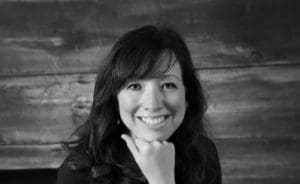Speaking for the Future. Member Spotlight: Julie Richard
Julie Richard is a practicing lawyer, in her home country of Canada, where she runs a practice with another lawyer, about 6 hours north of Toronto. During her undergraduate degree, she switched early on to a major in international relations and political science and found that it really spoke to her. This interest in global politics has stuck with her since and guides a lot of how she views the nature of conflict and dispute resolution.
A Foray into International Law
 As part of Julie’s undergraduate degree, she spent a year in Wales, and additionally, she had the opportunity to teach kindergarten in Hong Kong for a year. This experience sparked a passion for working with children which has lasted her whole career; and developed her belief that ‘kids are such a huge resource that we don’t invest in, and they provide the biggest return.’ She, coincidentally, worked for the provincial legislative assembly around the same time and conducted research on what kind of returns they would get if they invested in education for young children, wherein she realized for herself that investing in better schooling and care for young people allows for a healthier, more productive society overall.
As part of Julie’s undergraduate degree, she spent a year in Wales, and additionally, she had the opportunity to teach kindergarten in Hong Kong for a year. This experience sparked a passion for working with children which has lasted her whole career; and developed her belief that ‘kids are such a huge resource that we don’t invest in, and they provide the biggest return.’ She, coincidentally, worked for the provincial legislative assembly around the same time and conducted research on what kind of returns they would get if they invested in education for young children, wherein she realized for herself that investing in better schooling and care for young people allows for a healthier, more productive society overall.
After university, Julie went to law school, where she specialized in administrative law and wrote her thesis on the UN and the concept of international law. This was a part of a longstanding interest in international affairs and belief in the importance of international bodies and norms; Julie understands deeply the imperfections in workings of international law, supranational organizations, and other such institutions. But, like her belief in the practice of mediation and dispute resolution, she knows that one does not always have to aim for perfection and a perfect agreement – she believes that ‘what matters is that there’s a forum’, and a method in place to communicate more effectively. Early in her career, Julie went on to work in the Attorney General’s Office in New Brunswick. She was in the Constitutional Law unit, and as she put it, ‘it was a dream come true.’ There, she had the chance to specialize in her work in aboriginal law.
An Emphasis on Child Protection Law
For the last 10 years, Julie has been running her own practice in the small town of Kirkland Lake, Ontario. Her firm takes on standard legal cases, but as part of the practice, she works for the Office of the Children’s Lawyer, a position in which she is contracted to represent children in child protection matters and in custody battles. During this practice, she started working more and more in mediation and alternative dispute resolution – not as a mediator but as an advocate for the kids she is representing. As part of her specialty in child protection and aboriginal practices and law, she began to engage in dispute resolution practices more generally, including engaging in talking circles in indigenous communities. In this work, she always strives to recognize and be sensitive to the aboriginal process, from which forms of restorative practices we use in mainstream culture originate.
Although she works in law, her aim is to promote communication in family and child protection cases, with the goal of reducing instances of harm and separation.
Within a custody battle, Julie notes that there is always a disclosure meeting during the court process, which she conducts with the parents. Although this is not a formal mediation, Julie notes that the value of it is similar to mediation practices, in that there is a goal to communicate openly, tell them what their children want them to understand, and try to find a resolution that will allow them to move on as a separated family in a peaceful manner. As a child advocate, it is much like mediation practices in that the goal can be set to work together to solve a problem that both parents face – rather than a win-lose scenario.
Advice for Future Mediators
Julie has an understanding of conflict and dispute resolution that is both complex and extremely straightforward, and the idea can be applied all the way up to global conflict “it doesn’t matter if it’s with your neighbor or between states when there’s no communication and there’s no awareness of a process that’s available, that’s when the issues flare up, and it doesn’t matter the size of the conflict; the goal in any dispute resolution process ‘shouldn’t necessarily be an agreement, but one that fosters tolerance.” Julie also applies her dispute resolution skills in civil litigation cases, but the part of her practice she holds nearest to her heart is ensuring children are heard. When prompted to give advice for any young people who want to work in mediation, peacebuilding, or strive to make the world around them a better place, Julie says that one just has to realize that we’re all interconnected as people, and it does not matter how small your process is; ‘no matter where you are, you can do well, and you can help’.
Article by Lizzy Nestor, MBBI Writer
